词汇学复习整理
词汇学复习范围

复习重点:第一章1. word的正规定义及简略定义;2. 词汇的定义的四部分;3. sound与meaning的关系;4. 书写发音不一只的五个原因。
第二章1. Roman Language family的五个成员,Germanic language family的八个成员;2. 英语语言发展的三个时期:1)时间跨度;2)事件;3)每个事件带来的语言;4)词汇涉及的语言领域;3. 对英语词汇奉献最大的是Latin语言;对英语语言影响(含语法和词汇影响)最大的是French。
第三章1. morpheme的正规定义级简略定义。
2. allomorph的定义3. free morpheme 和bound morpheme的正规定义和简略定义4. root, stem 和base 的定义及关系。
第四章1. 英语构词法的主要构词方式和次要构词方式;2. affixation的定义,分类及其分类的定义;3. compounding的定义及特点;4. shortening的种类;5. blending的定义;6. clipping的定义;7. acronymy的定义和种类及种类的定义;8. backformation的定义第五章1. reference,concept 和sense的定义;2. 词义的两部分的定义;3. 词汇意义的分类定义,下分类的定义;第六章1. polysemy 的定义2. homonymy的定义和分类级分类定义;3. synonymy的传统和现代定义和分类及分类的定义;4. antonymy的传统和现代定义和分类及分类的定义;。
英语词汇学复习大纲整理
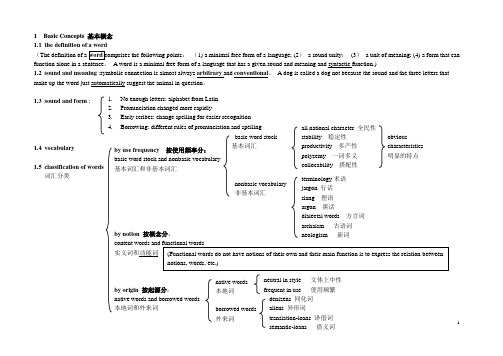
1 B a s i c C o n c e p t s 基本概念1.1 the definition of a word(: (1) a minimal free form of a language; (2) a sound unity ; (3) a unit of meaning; (4) a form that can function alone in a sentence 。
A word is a minimal free form of a language that has a given sound and meaning and syntactic function.)1.2 sound and meaning :symbolic connection is almost always arbitrary and conventional 。
A dog is called a dog not because the sound and the three letters thatmake up the word just automatically suggest the animal in question 。
1.3 sound and form : 1.4 vocabulary 1.5 classification of words 词汇分类 basic word stock 基本词汇nonbasic vocabulary 非基本词汇 by use frequency 按使用频率分: basic word stock and nonbasic vocabulary 基本词汇和非基本词汇by notion 按概念分:content words and functional words实义词和功能词by origin 按起源分: native words and borrowed words 本地词和外来词 all national character 全民性stability 稳定性 productivity 多产性 polysemy 一词多义 collocability 搭配性terminology 术语jargon 行话slang 俚语argon 黑话dialectal words 方言词archaism 古语词neologism 新词neutral in style 文体上中性frequent in use 使用频繁native words 本地词 borrowed words 外来词 denizens 同化词aliens 异形词translation-loans 译借词1. No enough letters: alphabet from Latin2. Pronunciation changed more rapidly3. Early scribes: change spelling for easier recognition4. Borrowing: different rules of pronunciation and spelling obviouscharacteristics明显的特点(Functional words do not have notions of their own and their main function is to express the relation betweennotions, words, etc.)2 D e v e l o p m e n tIt is assumed that the world has approximately 3, 000 (some put it 5, 000 ) languages , which can be grouped into roughly 300 language families on the basis of similarities in their basic word stock and grammar. 2。
英语词汇学知识点整理
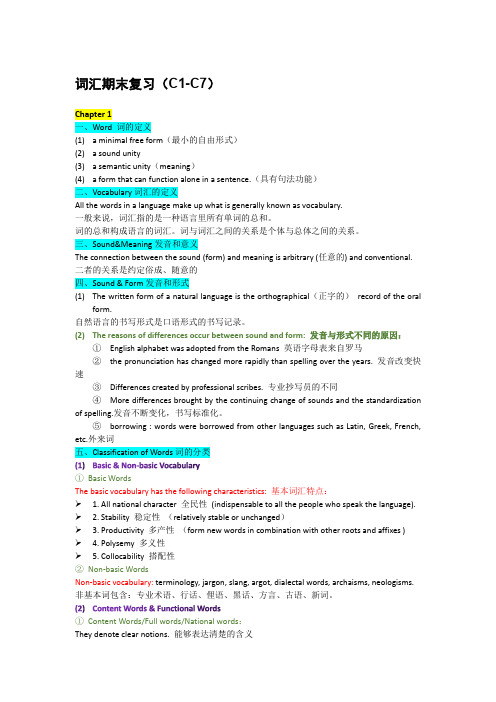
词汇期末复习(C1-C7)Chapter 1一、Word 词的定义(1) a minimal free form(最小的自由形式)(2) a sound unity(3) a semantic unity(meaning)(4) a form that can function alone in a sentence.(具有句法功能)二、Vocabulary词汇的定义All the words in a language make up what is generally known as vocabulary.一般来说,词汇指的是一种语言里所有单词的总和。
词的总和构成语言的词汇。
词与词汇之间的关系是个体与总体之间的关系。
三、Sound&Meaning发音和意义The connection between the sound (form) and meaning is arbitrary (任意的) and conventional. 二者的关系是约定俗成、随意的四、Sound & Form发音和形式(1)The written form of a natural language is the orthographical(正字的)record of the oralform.自然语言的书写形式是口语形式的书写记录。
(2)The reasons of differences occur between sound and form: 发音与形式不同的原因:①English alphabet was adopted from the Romans 英语字母表来自罗马②the pronunciation has changed more rapidly than spelling over the years. 发音改变快速③Differences created by professional scribes. 专业抄写员的不同④More differences brought by the continuing change of sounds and the standardization of spelling.发音不断变化,书写标准化。
词汇学复习重点
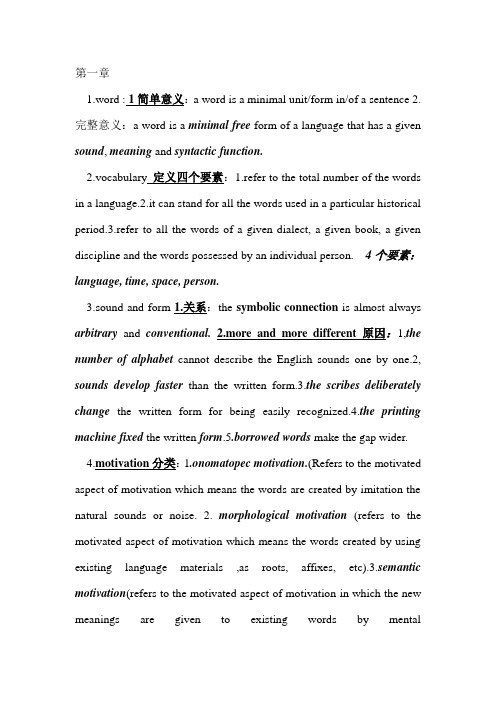
第一章1.word : 1简单意义:a word is a minimal unit/form in/of a sentence2.完整意义:a word is a minimal free form of a language that has a given sound, meaning and syntactic function.2.vocabulary定义四个要素:1.refer to the total number of the words in a language.2.it can stand for all the words used in a particular historical period.3.refer to all the words of a given dialect, a given book, a given discipline and the words possessed by an individual person. 4个要素:language, time, space, person.3.sound and form 1.关系:the symbolic connection is almost always arbitrary and conventional.2.more and more different 原因:1,the number of alphabet cannot describe the English sounds one by one.2, sounds develop faster than the written form.3.the scribes deliberately change the written form for being easily recognized.4.the printing machine fixed the written form.5.borrowed words make the gap wider. 4.motivation分类:1.onomatopec motivation.(Refers to the motivated aspect of motivation which means the words are created by imitation the natural sounds or noise. 2. morphological motivation(refers to the motivated aspect of motivation which means the words created by using existing language materials ,as roots, affixes, etc).3.semantic motivation(refers to the motivated aspect of motivation in which the new meanings are given to existing words by mentalassaiations.4.etymological motivation(refers to the motivated aspect of motivation by which the new meanings can directly tell the origin of the word.)4.word meaning 分类:4. “All national character”is the most important of all the features that may differentiate words of common use from all others.basic word stock基础词汇:1.all national character(全民性,必须有)2.stability 3.productivity 4.polysemy(一词多义)5.collocability(可搭配性) –5.Nonbasic vocabulary. 1。
《英语词汇学 》复习资料
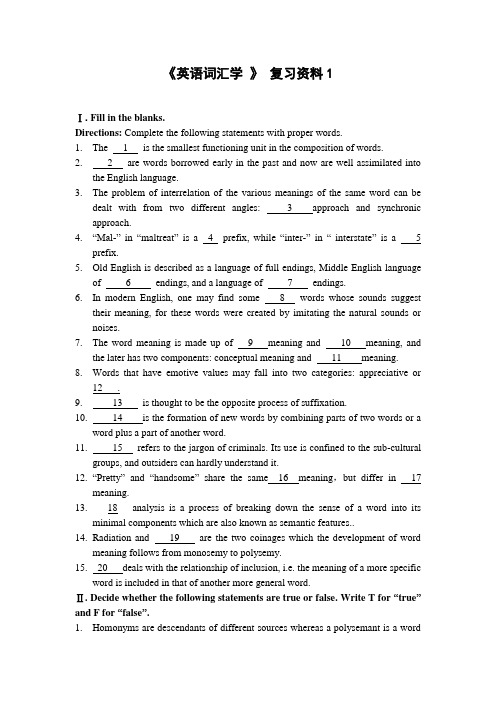
《英语词汇学》复习资料1Ⅰ. Fill in the blanks.Directions: Complete the following statements with proper words.1.The 1 is the smallest functioning unit in the composition of words.2. 2 are words borrowed early in the past and now are well assimilated intothe English language.3.The problem of interrelation of the various meanings of the same word can bedealt with from two different angles: 3 approach and synchronic approach.4.“Mal-”in “maltreat”is a 4 prefix, while “inter-”in “interstate”is a 5prefix.5.Old English is described as a language of full endings, Middle English languageof 6 endings, and a language of 7 endings.6.In modern English, one may find some 8 words whose sounds suggesttheir meaning, for these words were created by imitating the natural sounds or noises.7.The word meaning is made up of 9 meaning and 10 meaning, andthe later has two components: conceptual meaning and 11 meaning.8.Words that have emotive values may fall into two categories: appreciative or12 .9.13 is thought to be the opposite process of suffixation.10.14 is the formation of new words by combining parts of two words or aword plus a part of another word.11.15 refers to the jargon of criminals. Its use is confined to the sub-culturalgroups, and outsiders can hardly understand it.12.“Pretty”and “handsome”share the same 16 meaning,but differ in 17meaning.13.___18___analysis is a process of breaking down the sense of a word into itsminimal components which are also known as semantic features..14.Radiation and 19 are the two coinages which the development of wordmeaning follows from monosemy to polysemy.15.20 deals with the relationship of inclusion, i.e. the meaning of a more specificword is included in that of another more general word.Ⅱ. Decide whether the following statements are true or false. Write T for “true”and F for “false”.1.Homonyms are descendants of different sources whereas a polysemant is a wordof the same source which has acquired different meanings in the course of development.2.Words of the basic word stock are mostly root words or monosyllabic words, sothey have strong productivity.3.“Can-opener” used as slang to mean “all-purpose key”.4.Native words are neutral in style.5.The Indo-European language family is made up of most languages of Europe, theFar East, and India.6.Borrowing has played a vital role in the development of English vocabulary,particularly in earlier times.7.The smallest functioning unit in the composition of words is morpheme.8.Stem is a form to which affixes of any kind can be added.9.Base is what remains of a word after the removal of all affixes.10.Words created by compounding occupy the highest percentage of the Englishvocabulary.11.“Fore-”in “forehead”and “fore-”in “foreknowledge”belong to two kinds ofprefix.12.Word-building and word-formation are relative synonyms.13.The word manusc ript which originally denotes “handwriting” only has undergonea process of extension of meaning.14.Parent—child and husband—wife are two pairs of converses.15.Policeman, constable, bobby and cop are synonyms differing in intensity.Ⅲ. Answer the following questions briefly.1.What are the characteristics of the basic word stock?2.Why are prefixes and suffixes divided according to different criteria?3.List the four sources of synonyms.4.What are the characteristics of conceptual meaning and associative meaning? Ⅳ. Answer the following questions according to the requirement.Classify the three pairs of antonyms according to types of antonyms you have learned and describe the characteristics of each type of them.interviewer/interviewee; male/female; old /young成考复习资料答案I.Fill in the blanks.1. morpheme2. denizens3. diachronic4. pejorative5. locative6. leveled7. lost8. onomatopoeic9. grammatical10. lexical11.associative 12. pejorative 13. backformation 14. blending15. argot 16. conceptual 17. collocative 18. componential 19.concatenation 20. hyponymyII.Decide whether the following statements are true or false. Write T for “true” and F for “false”.1-5 TTTFT 6-10 TFFFT 11-15 TFFTFIII.Answer the following questions briefly.1.What are the characteristics of the basic word stock?1)All national character 2) stability 3) productivity 4) polysemy5) collocability2.Why are prefixes and suffixes divided according to different criteria?1)Prefixes primarily effect a semantic modification of the base, i.e. prefixes do notgenerally change the word-class of the base but only modify its meaning.2)Suffixes have only a small semantic role and their primary function is to changethe grammatical function of the base, i.e. the change of the word class with a slight modification of meaning.3)So prefixes are categorized on a semantic basis while suffixes are divided on agrammatical basis.3.1)Borrowing; (2) dialects and regional English (3) figurative and euphemisticuse of words (4) coincidence with idiomatic expressions4.What are the characteristics of conceptual meaning and associative meaning?1)Conceptual meaning is the meaning given in the dictionary and forms thecore of word meaning. Being constant and relatively stable, conceptualmeaning forms the basis for communication as the same word generallyhas the same conceptual meaning to the speakers in the same speechcommunity. (3%)2)Associative meaning differs from the conceptual meaning in that it isopen-ended and indeterminate, liable to the influence of such factors asculture, experience, religion, geographical region, class background,education, etc…(3%)Ⅳ. Analyze the following questions and explain them according to the requirement.1.1)Interviewer& interviewee are converses; male & female arecomplementaries; old & young are contraries.2)Complementaries truly represent oppositeness of meaning. They are soopposite to each other that they are mutually exclusive and admit nopossibility between them. The assertion of one is the denial of the other orvice versa. Complementaries are nongradable, and they cannot be used incomparative degrees and do not allow adverbs of intensity like “very”toqualify them.3)Contraries are gradable antonyms. The existence of one is in relation to theother. We can say: A man is rich or very rich and also we can say a man isrich than the other. Contraries are characteristic of semantic polarity. Theseantonyms form part of a scale of values between two poles and canaccommodate a middle ground belonging neither to one pole nor to the other.4)Converses consist of relational opposites. The pairs of words indicatereciprocal social relationships that one of them cannot be used withoutsuggesting the other. It also includes reverse terms, which compriseadjectives and adverbs signifying a quality or verbs and nouns signifying anact or state that reverse or undo the quality, action or state of the other.成考复习资料复习资料2I. 单选题1. In the sentence “I like to see a movie.”, there are ________ functional words.A. 2B. 3C. 4D. 52. Conversion is amethod________________________.A. of turning words of one part of speech to those of a different part of speechB. of converting words of one meaning into different meaningC. of deriving words through grammatical meansD. of changing words in morphological structure3. The following words have derivational affixes EXCEPT ________________.A. subseaB. prewarC. postwarD. desks4. Which of the following statements is false?A. Conversion refers to the use of words of one class as that of a different class.B. Words mainly involved in conversion are nouns, verbs and adverbs.C. Partial conversion and full conversion are concerned with adjectiveswhen converted to nouns.D. The conversion between nouns and verbs may involve a change of stress.5. _________ is the meaning given in the dictionary and forms the core ofword-meaning.A. Grammatical meaningB. Denotative meaningC. Associative meaningD. Connotative meaning6. The words what have emotive content in themselves are said to contain __ meaning.A. collocativeB. affectiveC. stylisticD. denotative7. __________ explains the connection between the literal sense and figurative sense of the word.A. Etymological motivationB. Onomatopoetic motivationC. Morphological motivationD. Semantic motivation8. The following words have inflectional affixes EXCEPT __________.A. worksB. workerC. workingD. worked9. “Smog”is formed by combining “smoke”and “fog”. So it is an example ofA. clippingB. compounding成考复习资料C. blendingD. back-formation10. The word “smog”is created by blending, with the structure of __________.A. head + tailB. head + headC. head + wordD. word + tail11. The most important mode of vocabulary development in present-day English is the creation of new words by means of ________________.A. translation-loansB. emantic loansC. word formationD. borrowings12. Which of the following belongs to a semantic field?A. steed, charger, palfrey, plug, nagB. pony, mustang, mule, stud, mareC. policeman, constable, bobby, copD. domicile, residence, abode, home13. Words which are used to show the attitude of approval are ________________.A. appreciativeB. pejorativeC. conntativeD. collocative14. General features of English contains the following except _________.A. simplicityB. receptivityC. adaptabilityD. imprssiveness15. The most productive means of word-formation in modern English are the following except .A. compoundingB. affixationC. acronymD. conversionII判断题1. The Indo-European language family is made up of most languages of Europe, theFar East, and India. ()2. The word manusc ript which originally denotes “handwriting” only has undergone aprocess of extension of meaning. ()3. The beginning of the Middle English Period was marked by the Norman Conquestwhich brought many Latin words into the English language. ()4. Words of the basic word stock are mostly root words or monosyllabic words, sothey have strong productivity. ()5. Grammatical meaning or a word includes part of speech, tense meaning, andstylistic coloring. ()6. Words created by compounding occupy the highest percentage of the Englishvocabulary. ()7. The marked term of each pair of antonyms covers the sense of the unmarked term.()8. Policeman, constable, bobby and cop are synonyms differing in intensity. ()9. Borrowing has played a vital role in the development of English vocabulary,particularly in earlier times. ()10. “Radiation” shows that the derived meanings of a polysemantic word are not成考复习资料directly related to the primary meaning. ()III简答题1. What are the characteristics of conceptual meaning and associative meaning?2. List different types of associative meaning and define them.答案I. 1-5 AADDB 6-10 BDBCA 11-15 CBADCⅡ. 1-5 TFFTF 6-10 TFFTFⅢ. 1. What are the characteristics of conceptual meaning and associative meaning? Conceptual meaning is the meaning given in the dictionary and forms the core of word meaning. Being constant and relatively stable, conceptual meaning forms the basis for communication as the same word generally has the same conceptual meaning to the speakers in the same speech community. Associativemeaning differs from the conceptual meaning in that it is open-ended and indeterminate, liable to the influence of such factors as culture, experience, religion, geographical region, class background, education, etc…2. List different types of associative meaning and define them.Explain different types of homonyms with examples.Perfect homonyms are known as absolute homonyms, and they are words identical both in sound and spelling. E.g bear (to put up with) and bear(a kind of fruit)Homographs are words identical only in spelling but different in sound and meaning, e.g. sow (to scatter seeds) and sow (female adult pig) Homophones are words identical only in sound but different in spelling and meaning, e.g. dear ( a loved person) and deer (a kind of an animal)复习资料3I.Fill in the blanks.Directions: Complete the following statements with proper words.1.The __1 is the smallest functioning unit in the composition of words.2. 2 are words borrowed early in the past and now are well assimilated intothe English language.3.The problem of interrelation of the various meanings of the same word can bedealt with from two different angles: 3 approach and synchronic approach.4.“Mal” in “maltreat” is a 4 prefix, while “inter-” in “ interstate” is a 5_prefix.5.Old English is described as a language of full endings, Middle Englishlanguage of___6__ endings, and a language of __7__ endings.成考复习资料6.In modern English, one may find some 8 words whose sounds suggesttheir meaning, for these words were created by imitating the natural sounds or noises.7.The word meaning is made up of 9 meaning and 10 meaning, andthe later has two components: conceptual meaning and 11 meaning.8.Words that have emotive values may fall into two categories: appreciative or__12 .9.13 is thought to be the opposite process of suffixation.10.___14__ is the formation of new words by combining parts of two words or aword plus a part of another word.11.15 refers to the jargon of criminals. Its use is confined to the sub-culturalgroups, and outsiders can hardly understand it.12.“Pretty”and “handsome”share the same _16_ meaning, but differ in _17_meaning.13.___18___analysis is a process of breaking down the sense of a word into itsminimal components which are also known as semantic features.14.Radiation and ___19___ are the two coinages which the development of wordmeaning follows from monosemy to polysemy.15.__20____deals with the relationship of inclusion, i.e. the meaning of a morespecific word is included in that of another more general word.Ⅱ. Decide whether the following statements are true or false and write T or F on the answer sheet:1.Homonyms come mainly from borrowing, changes in sound and spelling, anddialects.2.“Radiation”shows that the derived meanings of a polysemantic word are notdirectly related to the primary meaning.3.Borrowing is a very important source of synonyms.4. A word which has a synonym naturally has an antonym.5.Hyponymy deals with the relationship of semantic inclusion.6.Motivation explains the connection between the linguistic form and its meaning.7.Grammatical meaning or a word includes part of speech, tense meaning, andstylistic coloring.8.The origins of the words are a key factor in distinguishing homonyms frompolysemants.9.The marked term of each pair of antonyms covers the sense of the unmarkedterm.10.If the words differ in range and intensity of meaning, the words are not identicalin denotation.11.The beginning of the Middle English Period was marked by the NormanConquest which brought many Latin words into the English language.ponential analysis is to break down. the conceptual sense of a word into itsminimal distinctive components.13.Celtic language made great contributions to the expansion of the Englishvocabulary.14.Native words enjoy the same features as the basic word stock and more.15.Shortening includes clipping and blending.Ⅲ. Answer the following questions briefly.1. Analyze the morphological structures of the following words and point out the types of the morphemes in terms of free and bound morphemes.unbearable international ex-prisoner.2. How would you explain the difference between back formation and suffixation? Give examples to illustrate your point.3. List different types of associative meaning and define them.4. Explain different types of homonyms with examples.Ⅳ. Analyze the following questions and explain them according to the requirement.1. What is the difference between homonyms and polysemants?成考复习资料答案I.Fill in the blanks.1. morpheme2. denizens3. diachronic4. pejorative5. locative6. leveled7. lost8. onomatopoeic9. grammatical 10. lexical 11.associative 12. pejorative 13. backformation 14. blending 15. argot 16. conceptual 17. collocative 18. componential 19. concatenation 20. hyponymyⅡ. Decide whether the following statements are true or false and write T or F in the brackets:1.F 2.F 3.T 4.F 5.T 6. T 7.F 8.T 9.F 10.T11.F 12. F 13. F 14. T 15. TⅢ. Answer the following questions briefly.1. Analyze the morphological structures of the following words and point out the types of the morphemes in terms of free and bound morphemes.unbearable international ex-prisoner.un+bear+able:(1)‘bear’ is a free morpheme, and ‘un’, ‘able’are bound morphemes. inter+nation+al: ‘nation’ is a free morpheme, and ‘inter, al’ are bound morphemes.ex+prison+er: ‘prison’ is a free morpheme, and ‘ex, er’ are bound morphemes.2. How would you explain the difference between back formation and suffixation? Give examples to illustrate your point.1)Back-formation is considered to be the opposite process of suffixation.2)Suffixation is the formation of new words by adding suffixes to bases.3)Backformation is therefore the method of creating words by removing thesupposed suffixes, so called because many of the removed endings are not suffixes but inseparable parts of the word.4)For example, it is a common practice to add –er, -or to verb bases to formagential nouns.5)Reasonably, people make verbs by dropping the ending such as –or in editor, -arin beggar and –er in butler.3. List different types of associative meaning and define them.1)Connotative meaning refers to the overtones or associations suggested by theconceptual meaning, traditionally known as connotations.2)Stylistic meaning refers to stylistic features, which make them appropriate fordifferent styles.3)Affective meaning expresses the speaker’s attitude towards the person or thing inquestion.4)Collocative meaning consists of the associations a word acquires on account ofthe meanings of words which tend to occur in its environment.4. Explain different types of homonyms with examples.(1)Perfect homonyms are known as absolute homonyms, and they are wordsidentical both in sound and spelling. E.g bear (to put up with) and bear (a kind of fruit)(2)Homographs are words identical only in spelling but different in sound andmeaning, e.g. sow (to scatter seeds) and sow (female adult pig)(3)Homophones are words identical only in sound but different in spelling andmeaning, e.g. dear ( a loved person) and deer (a kind of animal)Ⅳ. Analyze the following questions and explain them according to the requirement.1.What is the difference between homonyms and polysemants?1)Perfect homonyms and polysemants are fully identical with reference to spellingand pronunciation, as both have the same orthographical form but different meanings. This creates the problem of differentiation.2)The fundamental difference between homonyms and polysemants lies in the factthat the former refers to different lexemes which have the same form and the latter the one and same lexeme which has several distinguishable meanings.3)One important criterion by which to differentiate them is ‘etymology’, i.e.,homonyms are descendants of different sources whereas a polysemant is a word of the same source which has acquired different meanings in the course of development.4)The second principal consideration is ‘semantic relatedness’. The severalmeanings of a single polysemous lexeme are related and can be traced back to成考复习资料one central meaning. On the other hand, meanings of different homonyms have nothing to do with one another.5)In dictionaries, a polysemant has its meanings all listed under one headwordwhereas homonyms are listed as separate entries.。
词汇学复习
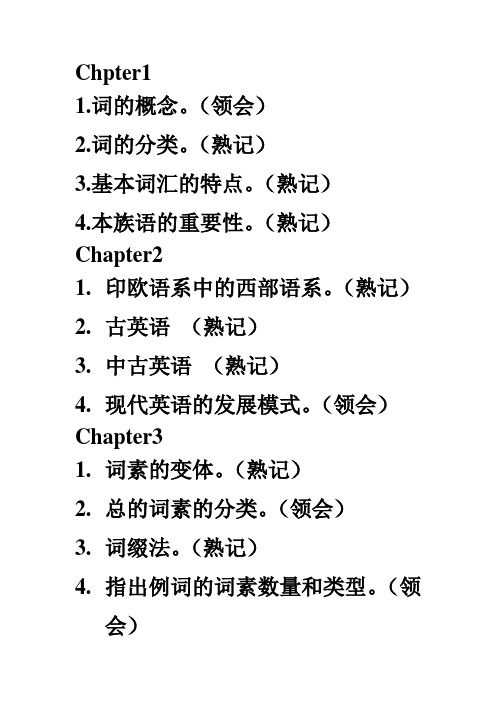
1.词的概念。
(领会)2.词的分类。
(熟记)3.基本词汇的特点。
(熟记)4.本族语的重要性。
(熟记)Chapter21.印欧语系中的西部语系。
(熟记)2.古英语(熟记)3.中古英语(熟记)4.现代英语的发展模式。
(领会)Chapter31.词素的变体。
(熟记)2.总的词素的分类。
(领会)3.词缀法。
(熟记)4.指出例词的词素数量和类型。
(领会)1.前缀的分类。
(熟记)2.转类法的类型。
(领会)3.部分转类法和完全转类法区别.(熟记)4.拼缀法类型。
(领会)5.截断法的概念。
(熟记)6.指出给的例词属于合成词,派生词,转类法的词,拼缀法,截断法,首字母缩略词,首字母拼音词,逆生法,来自于专有名词的词中的哪一个。
Chapter51.所指的概念。
(熟记)2.词的理据。
(熟记)3.理据的分类。
(领会)4.概念意义。
(熟记)5.褒义和贬义。
(领会)Chpter61.同义词的分类。
(熟记)2.反义词的分类。
(领会)3.上下义关系概念。
(熟记)4.语义场的作用。
(熟记)Chapter71.语义的扩大和缩小。
(领会)2.语义的降格。
(熟记)3.语境的作用。
(熟记)Chapter91.习语的特点。
(领会)2.习语的变异形式。
(领会)Chapter101. 单语词典和双语词典。
(熟记)。
词汇学复习资料

词汇学复习资料词汇学复习资料词汇学是语言学的一个重要分支,研究词汇的构成、分类和使用规律。
对于学习一门语言来说,掌握丰富的词汇是非常重要的。
在这篇文章中,我们将提供一些词汇学的复习资料,帮助读者巩固和扩展词汇量。
一、词汇的构成词汇是语言的基本单位,是由一个或多个音素组成的。
在不同的语言中,词汇的构成方式也有所不同。
例如,英语中的词汇主要由字母组成,而汉语中的词汇则由汉字组成。
1. 字母构词法英语中的词汇通常由字母组成,可以通过添加前缀、后缀和词根来构成新的词汇。
例如,单词“unhappiness”由前缀“un-”(表示否定)和词根“happy”组成。
2. 字形构词法汉语中的词汇由汉字组成,可以通过添加偏旁部首、衍生字和合成字来构成新的词汇。
例如,汉字“学”可以通过添加偏旁部首“子”来构成“字”,表示学习。
二、词汇的分类词汇可以按照不同的分类标准进行分类,例如按照词性、语义和用途等。
下面是一些常见的词汇分类。
1. 词性分类词汇可以分为名词、动词、形容词、副词、代词、介词、连词和感叹词等不同的词性。
名词用来表示人、事物或概念,动词用来表示动作或状态,形容词用来描述人或事物的特征,副词用来修饰动词、形容词或其他副词,代词用来代替名词,介词用来表示位置、时间或方式,连词用来连接词语或句子,感叹词用来表示强烈的情感。
2. 语义分类词汇可以按照词义的相似性进行分类。
例如,可以将名词按照人、动物、植物、物体、抽象概念等进行分类;将动词按照行为、状态、感觉、思维等进行分类;将形容词按照颜色、大小、形状、性质等进行分类。
3. 用途分类词汇可以按照在句子中的作用进行分类。
例如,可以将词汇分为实词和虚词。
实词包括名词、动词、形容词和副词,它们在句子中起到实际的意义;虚词包括代词、介词、连词和感叹词,它们在句子中起到连接或修饰的作用。
三、词汇的使用规律词汇的使用规律是指在特定语境中使用词汇的约束条件。
不同的语言和不同的语境中,词汇的使用规律也有所不同。
英语词汇学知识点归纳总结

英语词汇学知识点归纳总结
1.词汇分类:英语词汇可以分为实词和虚词两大类。
实词包括名词、
动词、形容词和副词,是能独立存在并具有词义的词类;虚词包括冠词、
介词、连词、代词和助词,是不能独立存在或不具有词义的词类。
2.词根与词缀:英语词汇中有很多词根和词缀,词根是词的核心部分,词缀是附加在词根上的,可以改变词的词义、词性或词形。
3.词义:英语词汇的词义可以通过定义、同义词、反义词、上下义词
等方式进行描述和解释。
词义可以有直观意义、引申意义和隐喻意义等。
4.词汇建构:英语词汇的建构可以通过合成、派生、转化、缩略等方
式进行。
合成是通过将两个或多个词根组合成一个新词,派生是通过添加
前缀或后缀来构成新词,转化是通过改变词的词类来构成新词,缩略是通
过省略部分词组或词根来构成新词。
5.词汇变化:英语词汇的变化形式包括时态、语态、人称、数和比较等。
词汇的变化形式可以通过词形变化、语法变化和语义变化等方式进行。
6.外借词:英语词汇中存在大量的外借词,这些词汇主要来自拉丁语、希腊语、法语、德语等其他语言。
外借词在英语中经过适当的拼写、读音
和意义调整后被接受和使用。
7.同源词:英语词汇中存在一些同源词,这些词源于同一词根或词源,并在语音、形态或词义上有一定的相似性。
了解同源词可以帮助理解和记
忆词汇。
8.词汇扩展:英语词汇在发展的过程中会发生扩展,即一个词从最初的特定意义扩展到更广泛的意义。
词汇扩展可以通过引申、转义、隐喻等方式进行。
这些是英语词汇学中的一些主要知识点,通过对这些知识点的学习和理解,可以更好地掌握和应用英语词汇。
词汇学复习资料

论述题一、一般词汇与基本词汇的关系基本词汇和一般词汇都有各自特点,因此,它们是语言词汇中两个完全不同的部分。
但是,基本词汇和一般词汇又有非常密切的联系,它们相互依存,共同发展,都是语言词汇中不可缺少的部分。
第一,基本词汇是语言的基础,它也是一般词汇形成的基础,一般词汇中的大多数词都是在基本词汇基础上形成的。
第二,一般词汇反映社会的发展是非常敏感的,它几乎经常存在不吨的变动之中,因此,语言词汇中的新成分往往首先出现在一般词汇中,然后个别成分再进入基本词汇中,促成基本词汇的发展。
从这一角度讲,一般词汇又可以充当基本词汇发展的源泉。
第三,基本词汇和一般词汇中的个别成分又是可以互相转换,在词汇发展的过程中,随着社会交际需要的改变,某些基本词转化成一般词,而某些一般词也能转化为基本词汇,如过去的基本词“鬼、窝窝头”等,现在已成了一般词,又如过去的一般词“党”,现在已经由一般词转化成基本词,成为“共产党”的简称。
总之,基本词汇和一般词汇就是在这样相互依存不断转化的关系中间共同发展和丰富起来。
它们的发展又形成整个词汇的形成。
二、词义发展的概况1、新词的增加。
语言是随着社会的发展而发展的,在这发展过程当中,词汇又是最敏感的部分,因此,社会上的一切都会在词汇中有所反映,这就促成了语言中新词的不断增加。
2、双音词的增多。
随着汉语的发展,词汇中的双音词逐渐增多起来,由单音向双音发展,是汉语词汇发展的一种必然现象。
因为随着社会的发展,交际的需求越来越纷繁复杂,需要表示的事物越来越多,有限的单音节形式就必然造成语言中同音词的大量出现。
因而给人们的交际带来许多不便,汉语词的双音化就此发展起来。
3、实词虚化现象的发展。
主要表现在两个方面:一方面是由实词类变为虚词类,如“因”原为“原因”,而后发展为“因为”,充当连词使用;另一方面,是由可以充当词根词素的实词虚化成了附加词素,如“了”原为“了结”虚化成了“好了”。
“了结”是实词,后来虚化成了词尾词素,读为“le”附在动词后面,表示完成体的语法意义,如“看了”、“做了”。
词汇学复习

第一单元英语词汇概说1.词是语音、形态和意义的统一体,音和形是词的物质外壳,意义是词的物质内容。
Word is the combination of pronunciation, morphology and meaning.2.词是在口语和书面语中能独立、自由使用的并具备完整意义的语言最小单位。
Word is the smallest meaningful linguistic unit that can be used on its own in oral and written language.3.词汇(vocabulary, lexicon): collection of words4.词汇是语言(language)的基本要素(语音、语法、词汇)之一。
Pronunciation, grammar, vocabulary5.Active vocabulary(积极性词汇): speaking/writing vocabularyPassive vocabulary(消极性词汇): reading/guessing vocabulary6.词汇学(lexicology): the science of wordsLexicology is the branch of linguistics that investigates, describes and theorizes about vocabulary. 作为语言学的一个分支,词汇学对词汇进行调查研究、描述并予以理论化。
第二、三单元英语基本构词法1.词素(morpheme)是语言中语音和语义的最小结合体。
Morpheme is the minimum unit of meaning.2.构词法(1)词缀法(affixation/derivation派生法)Prefixation 前缀法;Suffixation 后缀法Prefix do not generally change the world-class(词性) of the stem but only modify its meaning.(except “en-”, ”be-”, ”a-”) 三个可以决定词性的前缀Suffix mainly change the word-class ( except “less”)(2)复合法(compounding或composition)→复合词compound(3)转化法(conversion)也叫功能转换法(functional shift)或转移法(transmutation)(4)缩略法(abbreviation或shortening)·截短词clipped wordsapocope截除词尾,aphaeresis 截除词首front and back clipping截除首尾,syncope截除词腰·首字母缩略词initialisms·首字母拼音词acronyms·拼缀词blending e.g. stagflation = stagnation + inflation注:Acronym differ from initialism in that they are pronouncedas words rather than as sequences of letter.(5)逆生法(back formation)e.g. laser为首字母拼音词,因词尾形似后缀-er,则逆生出动词lase。
英语词汇学知识点整理

词汇期末复习(C1-C7)Chapter 1一、Word 词的定义(1) a minimal free form(最小的自由形式)(2) a sound unity(3) a semantic unity(meaning)(4) a form that can function alone in a sentence.(具有句法功能)二、Vocabulary词汇的定义All the words in a language make up what is generally known as vocabulary.一般来说,词汇指的是一种语言里所有单词的总和。
词的总和构成语言的词汇。
词与词汇之间的关系是个体与总体之间的关系。
三、Sound&Meaning发音和意义The connection between the sound (form) and meaning is arbitrary (任意的) and conventional. 二者的关系是约定俗成、随意的四、Sound & Form发音和形式(1)The written form of a natural language is the orthographical(正字的)record of the oralform.自然语言的书写形式是口语形式的书写记录。
(2)The reasons of differences occur between sound and form: 发音与形式不同的原因:①English alphabet was adopted from the Romans 英语字母表来自罗马②the pronunciation has changed more rapidly than spelling over the years. 发音改变快速③Differences created by professional scribes. 专业抄写员的不同④More differences brought by the continuing change of sounds and the standardization of spelling.发音不断变化,书写标准化。
英文专业词汇学考试复习资料
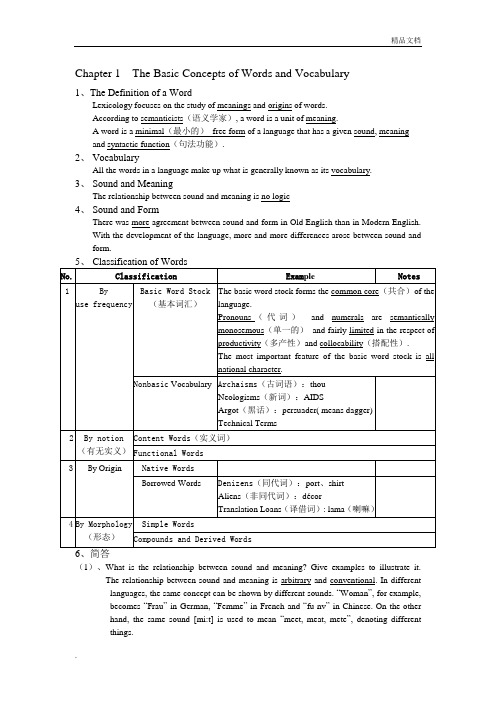
Chapter 1 The Basic Concepts of Words and Vocabulary1、The Definition of a WordLexicology focuses on the study of meanings and origins of words.According to semanticists(语义学家), a word is a unit of meaning.A word is a minimal(最小的)free form of a language that has a given sound, meaningand syntactic function(句法功能).2、 VocabularyAll the words in a language make up what is generally known as its vocabulary.3、 Sound and MeaningThe relationship between sound and meaning is no logic4、 Sound and FormThere was more agreement between sound and form in Old English than in Modern English.With the development of the language, more and more differences arose between sound and form.(1)、What is the relationship between sound and meaning? Give examples to illustrate it.The relationship between sound and meaning is arbitrary and conventional. In differentlanguages, the same concept can be shown by different sounds. “Woman”, for example,becomes “Frau” in German, “Femme” in French and “fu nv” in Chinese. On the otherhand, the same sound [mi:t] is used to mean “meet, meat, mete”, denoting differentthings.(2)、What are the four major reasons for the differences between sound and form?The first reason (he internal reason) is that there are more phonemes (音素)than lettersin English. Another reason is that the pronunciation has changed more rapidly thanspelling over the years. The third reasons that some of the differences more created bythe early scribes. The fourth reason is the borrowing.(3)、How are words classified in the course book?Words can be classified by different criteria and for different purposes. Words may fallinto: the basic word stock and nonbasic vocabulary by use frequency; content words andfunctional words by notion; native words and borrowed words by origin; simple words,compounds and derived words by morphology.(4)、What is the difference between denizens and aliens?Denizens are words borrowed early in the past and now are well assimilated(完全同化)into the English language. But aliens are borrowed words which have retained their original pronunciation and spelling. These words are immediately recognizable as foreign in origin.Chapter 2 The Development of the English Vocabulary1、The Indo-European Language FamilyThe prehistoric Indo-European parent language, thought to be a highly inflected (内部曲折语)language.The first peoples who inhabited the land were Celts.The second language known in English was Latin of the Roman Legions.(1)、Old English(450-1150)In the 9th century England was invaded by Norwegian and Danish Vikings.(2)、Middle English(1150-1500)The French influence on English vocabulary was one of the significant points of theMiddle English period.The most important fact of the Middle English period was the steady erosion of theinflectional systems of Old English.(3)、Modern English(1500-present)In the early period of Modern English, Europe saw a new upsurge of learning ancientGreek and Roman classics.It is estimated that about one fourth of modern English vocabulary has come from French.3、 Foreign Elements in the English VocabularyIn earlier stages of English, Latin, Greek, French and Scandinavian were the four major contributors.The simultaneous existence of French, Latin and English lasted for a century.4、 Modes of Vocabulary DevelopmentModern English vocabulary develops through three channels: creation, semantic change(旧词新义)and borrowing.Creation is the most important way of vocabulary expansion.5、简答What are the characteristics of Old English?Old English also known as the Anglo-Saxon, has a vocabulary of about 50000 to 60000 words, which are almost monogeneous and entirely Germanic with only a few borrowings from Latin and Scandinavian. Old English was a highly inflected language.It was a synthetic language(综合性语言).(Modern English is an analytic language)Chapter 3 Morphological Structure of English Words1、 MorphemesThe minimal meaningful units in English are known as morphemes(词素).Morphemes are abstract units, which are realized in speech by discrete units known as morphs.4、 Allomorphs(词素变体)An allomorph refers to a member of a set of morphs, which represent one morpheme.6、A root is the basic form of a word which cannot be further analyzed without total loss ofidentity.7、简答(1)、What is the difference between free morphemes and bound morphemes?Free morphemes which have complete meanings in themselves and can be used as freegrammatical units in sentences are independent of other morphemes, but boundmorphemes which cannot occur as separate. Words are bound to other morphemes to form words or to perform a particular grammatical function.(2)、What is the difference between derivational morphemes and inflectional morphemes?Derivational morphemes are used to derive new words, but inflectional morphemes areemployed used to indicate the syntactic (句法)relationship between words and functionas grammatical markers.Chapter 4 Word FormatioThe most productive ways of creating new words are affixation, compounding, and conversion. 1、AffixationThe words created by adding word forming or derivational affixes to bases are calledderivatives.2、Compounding(复合法)Example: workfare(work+welfare)In adjective-plus-noun compounds, the adjective element cannot take inflectional suffixes.Verb compounds are created either though conversion or through back-formation.3、Conversion(转类法)The conversion that takes place between nouns and verbs is the most productive.The conversion of two syllable nouns into verbs involves a change of stress.Nouns fully converted from adjectives have all the characteristics of nouns.4、 Blending(拼缀法)The overwhelming majority of blends are nouns5、Back-formation(逆身法)Back-formation is considered to be the opposite process of suffixation.6、简答(1)、What is the main difference between prefixes and suffixes?Unlike prefixes which primarily effect a semantic modification of the base, suffixeshave only a small semantic role, their primary function being to changes thegrammatical function of a base, i.e. the change of the word class with a slightmodification of meaning.(2)、What are the three main features of compounds?The three main features of compounds are phonological features, semantic features and grammatical features. The word stress of a compound usually occurs on the first element.Each compound should express a single idea just as one word. A compound tends to playa single grammatical role in a sentence.(3)、What is back-formation? What are the characteristics of back-formation?Back-formation is the method of creating words by removing the supposed suffixes.Words created through back-formation are verbs. Stylistically, back-formed words are largely informal and some of them have not successfully gained currency.(4)、What is acronymy? What is the difference between initialisms and acrnyms?Acronymy is the process of forming new words by joining the initial letters of composite names of social and political organizations or phrases used as technical terms. Words formed in this way are called initialisms or acronyms. Initialisms are pronounced letter by letter, but acronyms are pronounced as normal words7、论述题1、“Medicare” and “sitcom” are blends. “Medicare” is formed by combining the head of “medical’and the word “care”, and “sitcom” is formed by combining the head of “situation” and that of “comdey’.2、”Memo” and “flu” are clipped words. “Memo” is formed by clipping the lack of“memorandum” and “flu” is formed clipping the front and lack of “influenza”.3、”TB” and “NATO” are new words created through acronymy. “TB” from “tuberculosis” is aninitialism, while “NATO” from “the North Atlantic Treaty Organization” is an acronym.Chapter 5 Word Meaning and Componential Analysis(成份分析法)1、ReferenceWords are but symbols, many of which have meaning only when they have acquiredreference.2、Concept(概念)Meaning and concept are closely connected but not identical.Concept, which is beyond language, is the result of human cognition, reflecting the objective world in the human mind.3、SenseUnlike reference, sense denotes the relationships inside the language.4、Motivation(理据)(1)、What is reference? What are the characteristics of reference?Reference is the relationship between language and the world. By means of reference, a speaker indicates which things in the world are being talked about. The reference of a word to a thing outside the language is arbitrary and conventional. Although reference isa kind of abstraction, yet with the help of context, it can refer to something definite.(2)、What is conceptual meaning? What are the characteristics of conceptual meaning?Conceptual meaning known as cognitive, denotative, or designative is the meaning given in the dictionary and forms the core of word meaning. Being constant and relatively stable, conceptual meaning forms the basis for communication as The same word generally has the same conceptual meaning to all the speakers of the same speech community. (language).(3)、What is the difference between conceptual meaning and associative meaning?Conceptual meaning known as cognitive, denotative, or designative is the meaning given in the dictionary and forms the core of word meaning. But Associative meaning is the secondary meaning supplemented to the conceptual meaning. It differs from the conceptual meaning because it is open-ended and indeterminate, liable to the influence of such factors as culture, experience, religion, geographical region, class background, education, etc. .(4)、What is collocative meaning? What are the characteristics of collocative meaning?Collocative meaning is that part of the word meaning suggested by the words with which it co-occurs. It is again noticeable that collocative meaning overlaps with connotative and affective meaning because in a sense both connotative and affective meanings are revealed by virtue of collocations or contextuality.Chapter 6 Sense Relations(语义关系)The first meaning of a word is called primary meaning. Later meanings are called derived meaningsThe meaning of a more specific word is include in that of another more general word.简答What is the difference between radiation and concatenation(连锁型)?Unlike radiation where each of the derived meanings is directly connected to the primary meaning, concatenation describes a process where each of the later meanings is related only to the preceding one like chains.Chapter 7 Changes in Word MeaningThe vocabulary is the most unstable element of a language as it is undergoing constant changes both in the sign-shapes and sign contents.(1)、What is semantic transfer? What are the four main types of transfer?Some words which were used to designate/indicate one thing but later changed to meansomething else have experienced the process of semantic transfer. The four main typesof transfer are the associated transfer, the transfer between abstract and concretemeanings, the transfer between subjective and objective meanings and the synesthesim.(2)、What are the two factors causing changes in meanings? How are they classified?The two major factors that cause changes in meaning are the extra-linguistic factors andthe linguistic factors. The extra-linguistic factors include the historic reason, the classreason and the psychological reason. The linguistic factors include shortening,borrowing and analogy.(类比)Chapter 8 Meaning and Context(语境)1、 Types of ContextWithout context, there is no way to determine the meaning that the speaker intends to convey.When we talk about context, we usually think of linguistic context, hardly aware of theAmbiguity often arises due to polysemy, homonymy and grammatical structure. When a word with multiple meanings is employed in inadequate context, it creates ambiguity.3、简答(1)、what is the difference between linguistic context and extra-linguistic context?Linguistic refers to the words, clauses, sentences in which a word appears and it is known as linguistic context or co-text may extend to embrace a paragraph, a whole chapter and even the entire book. But extra-linguistic or non-linguistic context refers to the participants, time, place, and even the whole cultural background(2)、What is the difference between lexical context and grammatical context?Lexical context refers to the words that co-occur with the word in question. The meaning of the word is often affected and defined by the neighbouring words. But grammaticalcontext refers to the structure which may influence the meaning of a polysemant.4、论述题Read the sentence carefully. If you find anything inappropriate, explain the reasons and then improve the sentence.a.He is a hard businessman.John ran the egg and spoon race.1、The sentence is ambiguous. The ambiguity is caused by polysemy.2、The word “hard” in this sentence can be understood as “hardworking” or “difficult”.The context fails to narrow down the meaning so that it is difficult for the reader todecide what exactly the speaker means.3、The ambiguity can be eliminated by altering the context a little. There would be nomisunderstanding of the original sentence if it is expanded as “He is a hardbusinessman to deal with ”, or “He is a hard businessman and he is often praised by hisemployer”.(participated or organized John ran the egg and spoon race and got second place. orJohn ran the egg and spoon race and gain a larger number of money.)b.They saw her duck.The ball was attractive.1、The sentence is ambiguous. The ambiguity is caused by homonymy.2、The word “ball” in this sentence can be understood as a noun, which refer to “roundobject to play in a game” or a “dancing party”. The context fails to narrow down themeaning so that it is difficult for the reader to decide what exactly the speaker means.3、The ambiguity can be eliminated by altering the context a little. It is clear if it isexpanded as “The ball was attractive with nice music and a lot of peoples ”, or “Theball made of leather of different colors was attractive”.(kind of poultry or verb meaning ”lower one’s head or body quickly, dodge”They saw her duck or swimming in the river or They saw her duck her body.)c、The fish is ready to eat.I like Mary better than Jean.1、The sentence is ambiguous. The ambiguity is caused by inadequate grammaticalstructure..2、The sentence has two different interpretations. It may mean “the fish is cooked orserved, so ready for people to eat or a “the fish is ready to eat things”. The context fails to narrow down the meaning so that it is difficult for the reader to decide what exactly the speaker means.3、The sentence can be improved as “How nice the fish smell! The fish is ready to eat.” or“The fish is ready to eat things.(I like Mary better than I like Jean or I like Mary better than Jean likes MaryI like Mary better than Jean does. or I like Mary better than I do Jean.)Chapter 9 English IdiomsStylistically, idioms are generally felt to be informal and some are colloquialisms(口语体)and slang.(1)、What are the characteristics of English idioms?The two main characteristics of English idioms are semantic unity and structural stability.Idioms each consist of at least two or more constituents, but each is a semantic unity. The structure of an idiom is to a large extend invariable.(2)、What are the rhetorical features of English idioms?The rhetorical features of English idioms include the phonetic manipulation, the lexicalmanipulation and the semantic manipulation. The phonetic manipulation includesalliteration and rhyme(叠韵). The lexical manipulation includes reiteration, repletionand juxtaposition. The semantic manipulation includes (Figures of speech) Simile,Metaphor, Metonymy, Synecdoche, Personification, Euphemism.Chapter 10 English DictionariesThe main body of a dictionary is its definitions of words.3、Dictionaries(1)、Longman Dictionary of Contemporary English-English-Chinese(LDCE《朗文高级当代英语词典英汉双解》)Features: Clear Grammar Codes, Usage Notes, Language Notes, New words(2)、Collins COBUILD English Dictionary(CCED《柯林斯COBUILD英语词典》)Features: Definition, Extra Column, Frequency Marker, Pragmatics(词语用法说明)4、British or AmericanAmerican dictionaries contain more encyclopaedic information in the main body than British one whereas British dictionaries, especially learner’s dictionaries, embrace more grammatical information.5、简答What is a dictionary? What is the relationship between a dictionary and lexicology?A dictionary is a book which presents in alphabetical order the words of English,with information as to their spelling, pronunciation, meaning, usage, rules of grammar, and in some, their etymology. It is closely related to lexicology because both deal with the same problems: the form, meaning, usage and origins of vocabulary units.。
词汇学复习
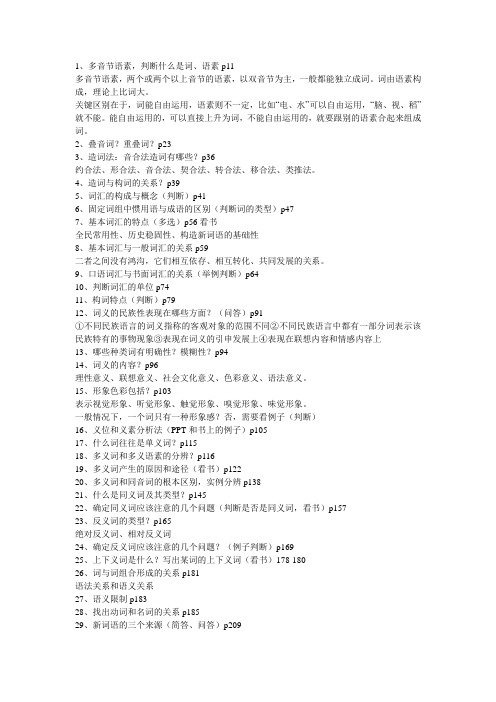
1、多音节语素,判断什么是词、语素p11多音节语素,两个或两个以上音节的语素,以双音节为主,一般都能独立成词。
词由语素构成,理论上比词大。
关键区别在于,词能自由运用,语素则不一定,比如“电、水”可以自由运用,“脑、视、稻”就不能。
能自由运用的,可以直接上升为词,不能自由运用的,就要跟别的语素合起来组成词。
2、叠音词?重叠词?p233、造词法:音合法造词有哪些?p36约合法、形合法、音合法、契合法、转合法、移合法、类推法。
4、造词与构词的关系?p395、词汇的构成与概念(判断)p416、固定词组中惯用语与成语的区别(判断词的类型)p477、基本词汇的特点(多选)p56看书全民常用性、历史稳固性、构造新词语的基础性8、基本词汇与一般词汇的关系p59二者之间没有鸿沟,它们相互依存、相互转化、共同发展的关系。
9、口语词汇与书面词汇的关系(举例判断)p6410、判断词汇的单位p7411、构词特点(判断)p7912、词义的民族性表现在哪些方面?(问答)p91①不同民族语言的词义指称的客观对象的范围不同②不同民族语言中都有一部分词表示该民族特有的事物现象③表现在词义的引申发展上④表现在联想内容和情感内容上13、哪些种类词有明确性?模糊性?p9414、词义的内容?p96理性意义、联想意义、社会文化意义、色彩意义、语法意义。
15、形象色彩包括?p103表示视觉形象、听觉形象、触觉形象、嗅觉形象、味觉形象。
一般情况下,一个词只有一种形象感?否,需要看例子(判断)16、义位和义素分析法(PPT和书上的例子)p10517、什么词往往是单义词?p11518、多义词和多义语素的分辨?p11619、多义词产生的原因和途径(看书)p12220、多义词和同音词的根本区别,实例分辨p13821、什么是同义词及其类型?p14522、确定同义词应该注意的几个问题(判断是否是同义词,看书)p15723、反义词的类型?p165绝对反义词、相对反义词24、确定反义词应该注意的几个问题?(例子判断)p16925、上下义词是什么?写出某词的上下义词(看书)178-18026、词与词组合形成的关系p181语法关系和语义关系27、语义限制p18328、找出动词和名词的关系p18529、新词语的三个来源(简答、问答)p209新造、吸收和转化。
自考2英语词汇学考试重点精华整理

自考2英语词汇学考试重点精华整理一、词汇学概述1、语言与词汇的关系:语言是词汇和语法规则的总和,而词汇则是语言中最基本的元素。
2、词汇学的定义:词汇学是研究语言的词汇以及词汇的起源、演变、语义和语用等方面的学科。
3、词汇学的研究对象:主要包括词汇的起源、演变过程、语义变化、文化背景等。
二、英语词汇的历史演变1、英语的起源:英语起源于古代日耳曼语,经过长时间的演变和发展,形成了今天的英语。
2、英语词汇的演变:英语词汇经历了许多变化,包括词义的变化、词形的变化、外来词的引入等。
3、英语词汇的分类:英语词汇可以根据其来源、语义、语法等方面进行分类。
三、英语词汇的语义关系1、同义词与反义词:同义词是指具有相同或相似意义的词汇,而反义词则是指具有相反意义的词汇。
2、上下义词与下义词:上下义词是指在一个词汇的语义场中,一个词可以表示另一个词的上层概念或下层概念。
3、词汇的文化意义:词汇的文化意义是指词汇在特定文化背景中所具有的意义。
四、英语词汇的记忆与运用1、记忆策略:记忆策略是指通过一定的方法来提高记忆效率,包括联想记忆、语境记忆等。
2、运用技巧:运用技巧是指在使用词汇时需要注意的事项,包括语用、语法等方面。
3、常见错误分析:常见错误分析是指对学生在使用词汇时容易犯的错误进行分析和纠正。
五、英语词汇的学习方法与技巧1、学习策略:学习策略是指通过一定的方法来提高学习效率,包括制定学习计划、使用学习工具等。
2、学习技巧:学习技巧是指在学习过程中需要注意的事项,包括如何集中注意力、如何提高学习效率等。
3、学习资源:学习资源是指在学习过程中可以使用的各种资源,包括书籍、网站、课程等。
词汇学是语言学的一个分支,主要研究词汇的起源、发展、变化和用法。
它涉及对单词的音、形、义、语法特征和语用意义等方面的研究。
词汇学有一些基本概念,包括词、词汇、词素、词义、语境等。
词是语言中最小的、可以独立使用的意义单位,词汇是语言中所有词的总和,词素是构成词的要素,词义是词的含义,语境是指词所处的语言环境。
词汇学笔记整理

Vocabulary also refers to all the words of a given dialect, given book,
a given discipline and the words possessed by an individual person.
adopted from the Romans, which does not have a separate letter to
represent each sound in the language so that some letters must do
double duty or work together in combination.
Classification of Words (本课的一个重点, 年年考试都考)
What is the classification of words? How to classify words in
linguistics?
Three criteria :
1) By use of frequency
,you
What are the characteristics of basic word stock?
1) All national character
2) Stability
3) Productivity
4) Polysemy
5) Collocability
要把握住‘All national character’的词,就是和我们日常生活息息相关的,最普通的词
《英语词汇学》知识点归纳
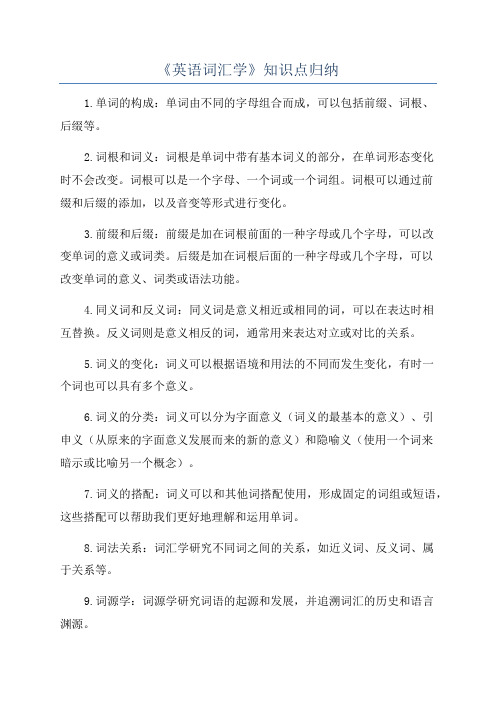
《英语词汇学》知识点归纳
1.单词的构成:单词由不同的字母组合而成,可以包括前缀、词根、
后缀等。
2.词根和词义:词根是单词中带有基本词义的部分,在单词形态变化
时不会改变。
词根可以是一个字母、一个词或一个词组。
词根可以通过前
缀和后缀的添加,以及音变等形式进行变化。
3.前缀和后缀:前缀是加在词根前面的一种字母或几个字母,可以改
变单词的意义或词类。
后缀是加在词根后面的一种字母或几个字母,可以
改变单词的意义、词类或语法功能。
4.同义词和反义词:同义词是意义相近或相同的词,可以在表达时相
互替换。
反义词则是意义相反的词,通常用来表达对立或对比的关系。
5.词义的变化:词义可以根据语境和用法的不同而发生变化,有时一
个词也可以具有多个意义。
6.词义的分类:词义可以分为字面意义(词义的最基本的意义)、引
申义(从原来的字面意义发展而来的新的意义)和隐喻义(使用一个词来
暗示或比喻另一个概念)。
7.词义的搭配:词义可以和其他词搭配使用,形成固定的词组或短语,这些搭配可以帮助我们更好地理解和运用单词。
8.词法关系:词汇学研究不同词之间的关系,如近义词、反义词、属
于关系等。
9.词源学:词源学研究词语的起源和发展,并追溯词汇的历史和语言
渊源。
10.词汇扩充:词汇学研究如何通过学习和运用词汇扩充词汇量,如学习词根、前缀和后缀的意义和用法,以及拆解和分析复杂单词的方法。
英语词汇学总结复习资料
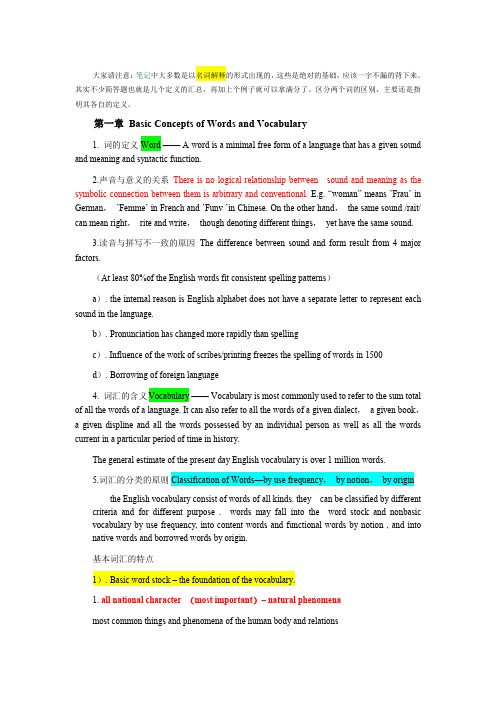
大家请注意:笔记中大多数是以名词解释的形式出现的,这些是绝对的基础,应该一字不漏的背下来。
其实不少简答题也就是几个定义的汇总,再加上个例子就可以拿满分了。
区分两个词的区别,主要还是指明其各自的定义。
第一章Basic Concepts of Words and Vocabulary1. 词的定义Word —— A word is a minimal free form of a language that has a given sound and meaning and syntactic function.2.声音与意义的关系There is no logical relationship between sound and meaning as the symbolic connection between them is arbitrary and conventional.E.g. “woman” means ’Frau’ in German,’Femme’ in French and ’Funv ’in Chinese. On the other hand,the same sound /rait/ can mean right,rite and write,though denoting different things,yet have the same sound.3.读音与拼写不一致的原因The difference between sound and form result from 4 major factors.(At least 80%of the English words fit consistent spelling patterns)a). the internal reason is English alphabet does not have a separate letter to represent each sound in the language.b). Pronunciation has changed more rapidly than spellingc). Influence of the work of scribes/printing freezes the spelling of words in 1500d). Borrowing of foreign language4. 词汇的含义Vocabulary —— Vocabulary is most commonly used to refer to the sum total of all the words of a language. It can also refer to all the words of a given dialect,a given book,a given displine and all the words possessed by an individual person as well as all the words current in a particular period of time in history.The general estimate of the present day English vocabulary is over 1 million words.5.词汇的分类的原则Classification of Words—by use frequency,by notion,by originthe English vocabulary consist of words of all kinds. they can be classified by different criteria and for different purpose . words may fall into the word stock and nonbasic vocabulary by use frequency, into content words and functional words by notion , and into native words and borrowed words by origin.基本词汇的特点1). Basic word stock – the foundation of the vocabulary.1.all national character (most important)– natural phenomenamost common things and phenomena of the human body and relationsworld around us names of plants and animals action,size,domain,state numerals,pronouns,prep. ,conj.2. stability– they donate the commonest thing necessary to life,they are like to remain unchanged. Only relative,some are undergoing some changes. But the change is slow.e.g. arrow,bow,chariot,knight – past electricity,machine,car,plane ——now3.productivity– they are mostly root words or monosyllabic words,they can form new words with other roots and affixes.e.g. foot – football,footage,footpath,footer4.polysemy – often possess more than one meaning. Become polysemous.e.g. take to move or carry from one place to another to remove5.collocability– quite a number of set expressions,idiomatic usages,proverbial saying and others基本词汇在英语中的地位和重要性The basic word stock is the foundation of the vocabulary accumulated over centuries and forms the common core of the language .though words of the basic word stock constitute a small percentage of the English vocabulary ,yet it is the most important part of it .e.g. heart – a change of heart, a heart of goldNon-basic vocabulary ——(例子)1. terminology –technical terms used in particular disciplines and academic areas as in medicinephotoscanning,hepatitis,indigestion,penicillin,algebra,trigonometry,calculus2. jargon– specialized vocabulary in certain professions.Bottom line,ballpark figures,bargaining chips,hold him back,hold him in,paranoid3. slang—— substandard words often used in informal occasionsdough and bread,grass and pot,beaver,smoky,bear,catch,holler,Roger,X-rays,Certain words are labeled slang because of their usage.4. argot – words used by sub-cultured groupscan-opener,dip,persuader cant,jargon ,argot are associated with,or most available to,specific groups of the population.5. dialectal words– only by speakers of the dialectbeauty,chook,cocky,station,auld,build,coo,hame,lough,bog6. archaisms – words no longer in common use or restricted in use. In older poems,legal document and religious writing or speech.7. neologism– newly created words with new meaning e.g. microelectronics,futurology,AIDS,internet,E-mailold meaning acquired new meaning e.g. mouse,monitor2). Content word (notional word)– denote clear notions.Functional word (empty word,form word)– do not have notions of their own,express the relation between notions,words and sentences.a. Content words constitute the main body of the English vocabulary are numerous.Functional words are in a small number.b. Content words are growing.Functional words remain stable.c. Functional words do far more work of expression than content words.3). Native words –are words brought to Britain in the 15 century by the German tribes. Ango-Saxon Words,50,000-60,000What is true of the basic word stock is also true of native world. More are1. neutral in style (not stylistical specific )2. 2.frequent in use (in academic fields and science French,Latin or Greek are used)(usage 70-90%)Borrowed words (loan words,borrowing)– words taken over from foreign language. 80%本族语词在英语中的地位和重要性Native words form the mainstream of the basic word stock and stand at the core of the language .therefore , what is true of the basic word stock is also true of native words.According to the degree of assimilation and manner of borrowing,we can bring the loan words under 4 classes.1.Denizen s– words borrowed early and now are well assimilated into English language.e.g. port from portus(L)shift,change,shirt,pork cup from cuppa(L)2.Aliens– retained their original pronunciation and spellinge.g. décor(F)blitzkreeg(G)emir,intermez,rowtow,bazaar,rajar,status quo3.translation loans– formed from the existing material in the English language but modeled on the patterns taken from another language.1). Word translated according to the meaninge.g. mother tough from lingua maternal(L)black humor from humor noir long time no see,surplus value,master piece2). Words translated according to the sounde.g. kulak from kyrak(Russ)lama from lama(Tib)ketchup tea4. Semantic loans– their meaning are borrowed from another languagee.g. stupid old dump new sassy dream old joy and peace pioneer old explorer/person doing pioneering work new a member of the young pioneer fresh old impertinent,sassy,cheeky第二章The Development of the English1、Indo-European language family (Europe,the Near East,India)It can be grouped into an Eastern set :Balto –Slavic 、Indo-Iranian、Armenian and Albanian; a Western set: Celtic、Italic 、Hellenic、GermanicIn the Eastern set , Armenian and Albanian are each the only modern language respectively,the Balto –Slavic comprises such modern language such as Prussian、Lithuanian、Polish、Czech、Bulgarian、Slovenian、Russian. In the Indo-Iranian we have Persian, Bengali, Hindi, Romany, the last three of which are derived from the dead language Sanskrit.In the Western set, Greek is the modern language derived from Hellenic. In the Celtic,we find Scottish, Irish,Welsh, Breton. the five Romance language ,namely, Portuguese,Spanish, French, Italian, Roumanian all belong to the Italic through an intermediate language called Latin. The Germanic family consist of the four Northern European language :Norwegian, Icelandic, Danish and Swedish, which are generally known as Scandinavian languages. Then there is German, Dutch, Flemish and English.2、History (时间,历史事件,特征)1)Old English (450-1150)totally 50,000-60,000 wordsThe 1st people known to inhabit England were Celts,the language was Celtic.The second language was the Latin of the Roman Legions. The Germanic tribes called angles,Saxons and Jutes and their language,Anglo-Saxon dominated and blotted out the Celtic. Now people refer to Anglo-Saxon as old English. At the end of 6th century,the introduction of Christianity has a great impact on the English vocabulary. The common practice was to create new words bycombining two native words. In the 9th century,many Scandinavian words came into English. At least 900 words of Scandinavian are in modern English,our daily life and speech.特点:highly inflected language///complex endings or vowel changes (full ending)2)Middle English (1150-1500)English,Latin,FrenchUntil 1066,although there were borrowings from Latin,the influence on English was mainly Germanic. But the Norman Conquest started a continual flow of French words into English.By the end of the 13th century,English gradually come back into public areas.Between 1250 and 150 about 9000 words of French origin pouered into English. 75% of them are till in use today.As many as 2500 words of Dutch origin come into English.特点:fewer inflections leveled ending3)Modern English (1500-up to now)early modern English (1500-1700)late modern English(1700-up to now)The Renaissance(the early period),Latin and Greek were recognized as the languages of the West ern world’s great literary heritage.From the 1500’s through the 1700’s ,many writers experimented with words. Over 10000 new words entered the English language .many of these were taken from Latin and Greek .The Industrial Revolution was in the mid-17 century. With the growth of colonization,British tentacles began a stretching out of to every corner of the globe,thus enabling English to absorb words from all major languages of the world.After World War II,many new words have been created to express new ideas,inventions and scientific achievements.More words are created by means of word-formation.thousands and thousands of new words have been entered to express new ideas inventions,and scientific achievements.more words are created by means of word-formation.in modern English,word endings were mostly lost with just a few exceptions English has evolved from a synthetic language to the present analytic language.science and technology terms make up about 45% of new words. words associated with life-style constitute of 24% and social and economic terms amount to over 10% .mention should be made of an opposite process of development i.e. old words falling out if use.特点:ending are almost lost.3. Three main sources new words当代英语词汇发展的现状New words sweep in at a rate much faster than at any other historical period of time .词汇发展的主要原因1).The rapid development of modern science and technology2).Social: economic and political changes3).The influence of other cultures and languages4. Three modes of vocabulary development(英语发展的三个主要方式:创造新词、旧词新意、借用外来语词)1. Creation – the formation of new words by using the existing materials,namely roots,affixes and other elements. (This is the most important way of vocabulary expansion.)2. Semantic change - an old form which take on a new meaning to meet the new need.3. Borrowing – to take in words from other languages.(played a vital role in the development of vocabulary , particularly in earlier times)4. (Reviving archaic or obsolete)French 30%,Latin 8%,Japanese Italian 7%,Spanish 6%,German Greek 5%,Russian Yiddish 4%第三章Word Formation*1. Morpheme(词素) ——A morpheme is the smallest meaningful unit of a language. (The smallest functional unit in the composition of words.)*2.Morph—— A morpheme must be realized by discrete units. These actual spoken minimal carriers of meaning are morphs.3.Monomorphenic words– morphemes are realized by single morphs.4.Allomorph(词素变体)——Some morphemes are realized by more than one morph according to their position. Such alternative morphs are allomorphemes. E.g. the morpheme of plurality (-s)has a number if allomorphemes in different sound context,e.g. in cats/s/,in bags/z/,in matches/iz/.5. Free morphemes or Free root —— The morphemes have complete meaning and van be used as free grammatical units in sentences,e.g. cat,walk. They are identical with root words. morphemes which are independent of other morphemes are considered to be free.6.Bound Morphemes——The morphemes cannot occur as separate words. They are bound to other morphemes to form words,e.g. recollection (re+collect+ion)collect – free morpheme re-and –ion are bound morphemes. (include bound root and affix)Bound morphemes are found in derived words.7.Bound root ——A bound root is that part of the word that carries the fundamental meaning just like a free root. Unlike a free root,it is a bound form and has to combine with other morphemes to make words. Take -dict- for example:it conveys the meaning of “say or speak” as a Latin root,but not as a word. With the prefix pre-(=before)we obtain the verb predict meaning “tell beforehand”。
词汇学期末复习各章知识点
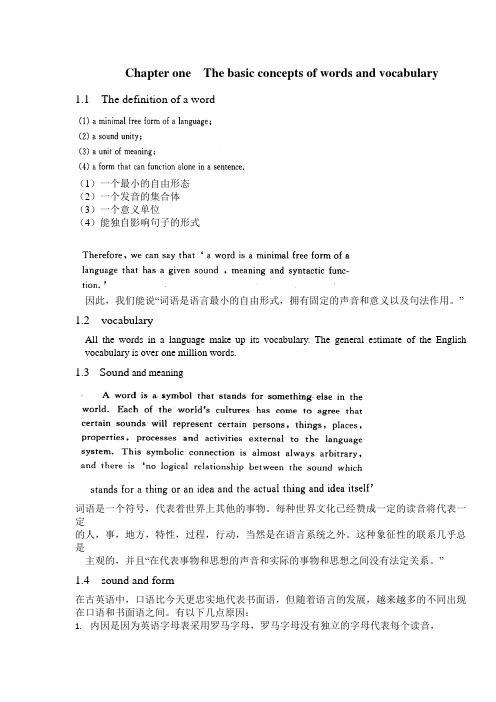
Chapter one The basic concepts of words and vocabulary1.1 The definition of a word(1)一个最小的自由形态(2)一个发音的集合体(3)一个意义单位(4)能独自影响句子的形式因此,我们能说“词语是语言最小的自由形式,拥有固定的声音和意义以及句法作用。
”1.2 vocabularyAll the words in a language make up its vocabulary. The general estimate of the English vocabulary is over one million words.1.3Sound and meaning词语是一个符号,代表着世界上其他的事物。
每种世界文化已经赞成一定的读音将代表一定的人,事,地方,特性,过程,行动,当然是在语言系统之外。
这种象征性的联系几乎总是主观的,并且“在代表事物和思想的声音和实际的事物和思想之间没有法定关系。
”1.4 sound and form在古英语中,口语比今天更忠实地代表书面语,但随着语言的发展,越来越多的不同出现在口语和书面语之间。
有以下几点原因:1.内因是因为英语字母表采用罗马字母,罗马字母没有独立的字母代表每个读音,因此一些字母代表两个读音或者组合在一起发音。
2.另一个原因是发音比拼写的变化快,在一些时候还拉开了距离。
在最近五百年里,尽管口语发音已经出现了显著的变化,却没有相应的拼写变化。
Another reason for this is that the pronunciation has changed more rapidly than spelling over the years, and in some cases the two have drawn far apart.3.第三个原因是一些早期的书写员发明了一些不同Those scribes had made some change to the word spelling4.到1500年年末,印刷已经变得非常普及。
语文词汇学知识点梳理
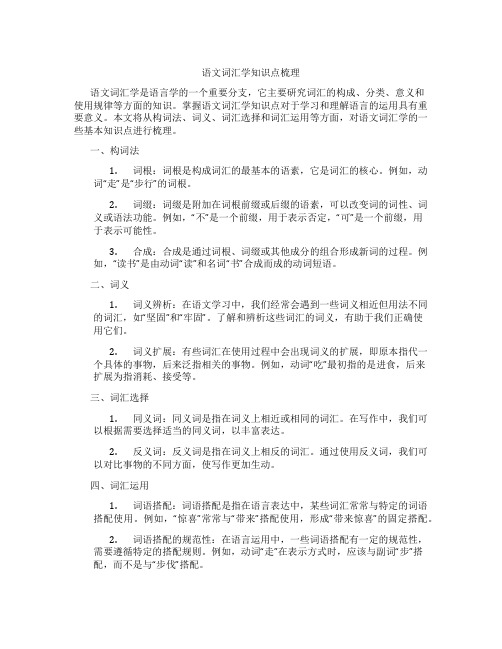
语文词汇学知识点梳理语文词汇学是语言学的一个重要分支,它主要研究词汇的构成、分类、意义和使用规律等方面的知识。
掌握语文词汇学知识点对于学习和理解语言的运用具有重要意义。
本文将从构词法、词义、词汇选择和词汇运用等方面,对语文词汇学的一些基本知识点进行梳理。
一、构词法1.词根:词根是构成词汇的最基本的语素,它是词汇的核心。
例如,动词“走”是“步行”的词根。
2.词缀:词缀是附加在词根前缀或后缀的语素,可以改变词的词性、词义或语法功能。
例如,“不”是一个前缀,用于表示否定,“可”是一个前缀,用于表示可能性。
3.合成:合成是通过词根、词缀或其他成分的组合形成新词的过程。
例如,“读书”是由动词“读”和名词“书”合成而成的动词短语。
二、词义1.词义辨析:在语文学习中,我们经常会遇到一些词义相近但用法不同的词汇,如“坚固”和“牢固”。
了解和辨析这些词汇的词义,有助于我们正确使用它们。
2.词义扩展:有些词汇在使用过程中会出现词义的扩展,即原本指代一个具体的事物,后来泛指相关的事物。
例如,动词“吃”最初指的是进食,后来扩展为指消耗、接受等。
三、词汇选择1.同义词:同义词是指在词义上相近或相同的词汇。
在写作中,我们可以根据需要选择适当的同义词,以丰富表达。
2.反义词:反义词是指在词义上相反的词汇。
通过使用反义词,我们可以对比事物的不同方面,使写作更加生动。
四、词汇运用1.词语搭配:词语搭配是指在语言表达中,某些词汇常常与特定的词语搭配使用。
例如,“惊喜”常常与“带来”搭配使用,形成“带来惊喜”的固定搭配。
2.词语搭配的规范性:在语言运用中,一些词语搭配有一定的规范性,需要遵循特定的搭配规则。
例如,动词“走”在表示方式时,应该与副词“步”搭配,而不是与“步伐”搭配。
以上是语文词汇学的一些基本知识点梳理。
通过掌握这些知识,我们可以更好地理解和运用词汇,提高语文水平。
同时,在学习过程中,我们也需要多加实践和运用,通过读书、写作等方式不断积累和扩展自己的词汇量,提高语言表达能力。
词汇学期末考试复习资料

词汇学期末考试复习资料第一章A word is a minimal free form of a language that has a given sound, meaning and syntactic functionWord ,Vocabulary的关系All the words in a language make up what is generally known as its vocabulary.The relationship between sound and meaning is almost always arbitrary and conventional, and there is no logical relationship between sound and meaning.Word-form and meaning: arbitrary and conventional.What is the relationship between sound and meaning?1)There is ‘no logical relationship between the sound and act ual thing.e.g. dog. cat2)The relationship between them is conventional.3) In different languages the same concept can be represented by different sounds.What is relationship between sound and form?1)The written form of a natural language is the written record of the oral form. Naturally the written form should agree with the oral form.2)This is fairly true of English in its earliest stageOld English3)With the development of the language, more and more diff erences occur between the two.What is the classification of words? How to classify words i n linguistics?Words may fall into the basic word stock and nonbasic vocabulary by use frequency, into content words and functional words by notion, and into native words and borrowed words byorigin.According to Stuart Robertson the nine functional words , namely ,and , be , have , it , of , the , to , will ,youWhat are the characteristics of basic word stock?1) All national character 2) Stability 3) Productivity 4) Polyse my 5) CollocabilityNone basic vocabulary1) Terminology e.g. sonata, algebra 专业术语2) Jargon e.g. Bottom line ( Jargon ) 行话3) Slang e.g. smoky, bear ( Slang ) 俚语4) Argot e.g. persuader 黑话,隐语5) Dialectal words e.g. station ( AusE = ranch ) bluid ( ScotE = blood)方言6) Archaisms e.g. wilt (will) 古语词7) Neologisms e.g. email ( Neologisms ) 新语词第二章语系Three Phases of the Historical DevelopmentThe first peoples who inhabited the land were Celts.The second language known in English was Latin of the Roman Legions.Celtic对英语的影响小,主要是place,river name。
- 1、下载文档前请自行甄别文档内容的完整性,平台不提供额外的编辑、内容补充、找答案等附加服务。
- 2、"仅部分预览"的文档,不可在线预览部分如存在完整性等问题,可反馈申请退款(可完整预览的文档不适用该条件!)。
- 3、如文档侵犯您的权益,请联系客服反馈,我们会尽快为您处理(人工客服工作时间:9:00-18:30)。
Chapter 1LEXICOLOGY: Lexicology is the science of words, which is concerned with the study of vocabulary of a given language. It deals with words, the origin, development, history, structure, meaning and application. In short, it is the study of the signification and application of words.Chapter 21.The history of English languageHistory of English language can be divided into Old English(450AD-1150AD), Middle English (1150AD-1500AD), and Modern English (1500AD-present).2.Classification of English wordsEnglish words can be divided into different groups in terms of the origin, the level of usage and the notion.By originNative words (Anglo-Saxon/ old English)Loan words (borrowed)By level of usage: 5 categoriesStandard/ popular word/ common wordsLiterary wordsColloquial wordsSlang wordsTechnical wordsBy notionContent words: They have the independent lexical meaning, e.g. noun, verb, adjective, adverb.Function words: They are determiners, conjunctions, prepositions, auxiliaries, and grammatical signals, functional makers.Pick up the slang words and explain.1.Father said nix to our plan, so we couldn’t go to the museum. (nothing, no)2.When the buck leads, the world suffers. (money, dollars)3.He says he’ll be a great writer but that’s a lot of boloney; he’ll never be. (nonsense)4.I’ll clobber you if you don’t do what you’re told, said the angry father. (beat sb.repeatedly)5.I think I’m just a hick at heart. (a foolish person from the country)6.He thought his idea was wonderful, but in fact, it was complete rot. (nonsense)Chapter 3Compounding: refers to the faculty and device of language to form new words by combining or putting together old words, e.g. schoolboy.Derivation: derivation is "Used to form new words, as with happi-ness and un-happy from happy, or determination from determine.Conversion: the creation of word from an existing word without any change in form, e.g. the adjective clean becomes the verb clean.Clipping: the formation of a new word by shortening it, e.g. ad from advertisement Acronyms: are abbreviations that are formed using the initial components in a phrase or name. These components may be individual letters (as in CEO) or parts of words (as in Benelux)Blending: word formed from parts of two or more other words. These parts are sometimes, but not always, morphemes, e.g. smog from smoke and fog.- The word “prejudice” implies that a judgment is made ___ (before/ after) the facts are studied.- A subcutaneous (皮下的) inflection is ___ (on/ under) the skin.- Supersensory impressions are ___ (within/ beyond) the normal limits of the senses.- The transpolar (跨越南北极的) flight goes ___ (around/ across) the pole.- A legislature with one chamber is ___ (unicameral/ bicameral).- A bicameral legislature has ___ (one/ two) chambers.- An interlinear has the meaning inserted ___ (opposite/ between) the lines.- Relation between cultural groups are said to be ___ (intercultural/ subcultural).- A multiplied insect has ___ (many/ two) feet.- Mark Twain’s The Mysterious Stranger was published posthumously, that is ___ (before/ after) his death.1. They are going to summer in Guilin.2. They hurrahed his wonderful performance.3. You have to round you lips in order to make the sound /u:/.4. They are great sillies.5. She dusted the furniture every morning.- Bicycle- Sergeant, SARGE- Gymnasium, GYM- Kilogram, KILO- Business, BIZ- Dormitory, DORM- Influenza, FLU- Automobile, AUTO- Sci-fi- Smog- Chinglish- Medicare- Email- Newscast- Brunch- telecast, television+broadcastChapter 4Two types of word meaningGrammatical meaningLexical meaningTense meaning of verbs: works, workedAspect meaning of verbs: working, workedCase meaning of nouns: John’s, boy’s, children’sPlural meaning of nouns: girl, girls; man, menComparative degree of adjectives or adverbs: bigger, simplerSuperlative degree of adjectives or adverbs: biggest, simplestDenotative meaning:the literal meaning of a word; there are no emotions, values, or images associated with denotative meaning. Scientific and mathematical language carries few, if any emotional or connotative meaningsConnotative meaning:The meaning suggested by the associations or emotions triggered by a word or phrase. OR A meaning of a word or phrase that is suggested or implied, as opposed to its literal meaning. The communicative value, an expression has by virtue of what itrefers to, over and above its purely conceptual content. Include both physical characteristics and psychological and social properties.Stylistic meaningAffective meaning (详见下)Conceptual meaningConceptual meaning is often described as dictionary meaning or literal meaning of a word. It is the core of the meaning of a word. It is relatively constant and stable, because it is the meaning agreed upon by all the members of the same speech community.2 Associative meaningAssociative meaning is that part of meaning which has been supplemented to the conceptual meaning. It is the meaning which arises of the associations a word acquires. It is open-ended, unstable and indeterminate, because it varies with culture, time, place, class, individual experiences, etc. Associative meaning includes connotative, stylistic, affective and collocative meanings.1)Connotative meaningConnotative meaning is the communicative value an expression has by virtue of what it refers to, over and above its purely conceptual content. Connotations are apt to vary from age to age and from society to society. Talking about connotation is in fact talking about the real world experience one associates with an expression when one uses or hears it.2)Stylistic meaningLanguage use can be formal, neutral and casual in style. The stylistic features of words, which make words appropriate for appropriate situations, constitute stylistic meanings of words.3) Affective meaningAffective meaning refers to that part of meaning which conveys emotions and attitudes of a language user. Sometimes affective meanings are brought out only in context.4)Collocative meaningCollocative meaning consists of the associations a word acquires on account of the meanings of words which tend to occur in its environment. In other words, it is that part of the word-meaning suggested by the words that go before or come after a word in question.Chapter 5SynonymyAntonymHyponymy (下位词): is a word or phrase whose semantic range is included within that of another word. For example, scarlet, vermilion, carmine, and crimson are all hyponyms of redFind the general word in each group- Automobile, vehicle- Book, dictionary- Captain, officer- Ceremony, wedding- Emotion, love- Occupation, teaching- We planted many ___ including ___. (Carrots, vegetables)- Is she a ___ or another kind of ___?(Doctor, surgeon)- It gave me a great ___ of ___. (Feeling, relief)- That ___ is going to be a ___. (Building, restaurant)Chapter 6Translate English idioms into Chinese or vice versa.- Cowards die many times before their deaths.- Easy come, easy go.- Fools rush in where angels fear to tread.- Nothing ventured, nothing gained.- One swallow does not make a summer. 一花独放不是春- The spirit is willing but the flesh is weak. 力不从心- Where there’s a will, there’s a way. 有志者事竟成Chapter 7Give at least one English example of each figure of speech.Simile (like, as)MetaphorPersonificationMetonymy (the act of referring to sth by the name of sth else that is closely connected with it, for example using the White House for the US president)Euphemism: an indirect word or phrase that people often use to refer to sth embarrassing or unpleasant, sometimes to make it seem more acceptable than it really is: 'Pass away' is a euphemism for 'die'.Hyperbole/ exaggeration: a way of speaking or writing that makes sth sound better, more exciting, dangerous, etc. than it really isOxymoron/ paradox: a phrase that combines two words that seem to be the opposite of each other, for example a deafening silenceChapter 8Remember some American and British word spelling and words for the same objects, e.g. Sweets (BrE), candyDefense (AmE), defenceDifferences in spellingDivergence British spelling American spelling our…or colour, neighbour color, neighbor ou…o mould, smoulder mold, smolder re…er centre, theatre center, theater gue…g catalogue, dialogure catalog, dialog ll…l travelling, travelingjeweller, jewelerskillful skilful mme…m programme, gramme program, gram omission of axe, judgement ax, judgment silent…e good-bye good-byce…se defence, licence defense, license e…i enquire, enclose inquire, inclose y…I tyre, dyke tire, dikec…k sceptic, disc skeptic, disks…z cosy, tsar cozy, tzarise…ize naturalise, utilise naturalize, utilizeSpecial casesBritish Americancheque, cigarette check, cigaretdraught, gaol, grey draft, jail, graykerb, plough, pyjamas curb, plow, pajamasstorey, waggon story, wagonAmerican and British words for common ideas or objectsAmerican Britishalumnus (of a school or university) graduatebar public house, pubcan (as a can of soup) tingraduate post graduate student candy sweetsclipping cuttingcloset cupboardcommuter ticket season ticket conductor guardsweetscorn maizedrugstore chemist’sfaculty (of university) staffgas, gasoline petrolinstructor lecturerjumper sweaterlong distance call trunk callmail, mailbox, mailman post, pillar box, postmanpackage parcelrailroad railwayschedule timetableshorts underpants or short trousers sneakers gym-shoesumbrella brollywaistcoat weskitwaste basket dustbintrash garbagepants trouserscracker biscuitelevator liftfirst floor ground floorpedestrian crossing zebra crossingliving-room sitting roomsidewalk pavementfreshman first-year studentsophomore second-year studentjunior third-year studentsenior fourth-year studentsoccer footballstore shopzip code post codesick illradio wirelesseyeglasses spectaclespaperboy newsboyprinciple headmastermovie star film starFinal Test—Items and Notes1. Check the only misspelled word in each group and write the correct form for each. (1’*5)e.g. A. whisper B. laughter C. confront D. confidence2. Change the following words into the class as required in the brackets. (1’*10)e.g. Develop (n) ___3. Complete the sentences by filling in the blanks with the following words. (1’*10)e.g. Fear laid ___ her show of bravery.4. Put the following pairs of antonyms in to the right groups according to the characteristics of antonym. (1’*15)5. Provide ONE English example for each figure of speech given below. (2’*5)6. Explain the italicized part in each sentence in your own words. (2’*5)7. Put the following Chinese proverbs into English and vice versa. (2’*10)8. Change the following British words into the corresponding American ones vice versa. (1’*10)9. Answer the question with examples. (10’)。
